Laser Dentistry and the Treatment of Cavities

Laser dentistry reduces discomfort during dental procedures. Take the treatment of gum disease as an example. Dentists apply laser beams of certain wavelengths to destroy the infection inside gum pockets. This eliminates the need for surgical removal of infected gum tissue, which translates to no incisions, excisions, bleeding, or sutures. The happy result is a pain-free procedure and speedy recovery times.
A cavity is a less extensive bacterial infection than gum disease. You can imagine how much smoother the treatment of cavities becomes with laser dentistry, or you could find out if you keep reading.
About laser dentistry
Lasers continue to add precision to many systems across many industries and sectors. They continue to yield revolutionary innovations in dentistry as well. In dentistry, lasers minimize or eliminate the need for drilling, cutting, and tissue removal. This is beneficial to the patient giving that:
- Dental procedures that employ lasers are less uncomfortable
- Such procedures require less anesthetic than their traditional equivalents
- There is little need for a drill or chisel, which most patients will appreciate
- Laser dentistry minimizes bleeding, thanks to the lack of incisions and stitches
- The procedure is also shorter than traditional treatments for cavities
- This translates into shorter, much more comfortable recovery times
- The cost of cavity treatment with laser is comparable to traditional alternatives
The next section goes over patient experience with laser dentistry as a treatment for tooth decay.
Laser dentistry as a treatment for cavities
Cavities are the result of bacterial attacks via acids they create on the enamel. Once bacteria breach the enamel, they set to attacking the inner layers of the tooth. With time, bacterial action increases the size of the cavity. The result is weak and infected tissue. Without treatment, a cavity will progress to become moderate tooth decay or severe root decay. Thankfully laser dentistry eliminates small problems before they grow.
Laser dentistry employs two types of laser. First is the hard-tissue laser, which dentists use on the enamel. Dentists use hard tissue lasers in place of a drill. They are less noisy and more precise, removing only the smallest amount of tissue.
The second type of laser is for use on soft tissues inside teeth, as well as the structures that support said teeth. Here is what happens when a dentist fills a cavity with a laser-powered device. This is what a patient should expect when they sit in the dentist’s chair:
- Depending on the patient’s anxiety level and the size of the cavity, the dentist may or may not administer anesthetic
- The dentist will rinse the patient’s mouth
- They will apply the hard-tissue laser to the pin-point location of the cavity, opening up the enamel to expose decay inside the tooth
- At this point, the dentist may dial down the amount of energy the laser instrument emits
- They will proceed to use the laser’s heat and light energy to kill bacteria and dislodge infected tissue
- The dentist will rinse out the inside of the tooth
- They will apply a putt-like filling and apply a curing light to turn the putty solid
- Lastly, they will smooth and polish the filling to the patient’s satisfaction
For a small cavity, the procedure will take less than an hour from start to finish. One of the things that lasers do is seal the nerve endings, which reduces the need for numbing. In some cases, anesthetic becomes completely unnecessary.
Limitations of laser dentistry for cavities
Dentists cannot use lasers to treat cavities that sit in awkward spots. For example, lasers cannot deal with a cavity that sits between two teeth. They cannot treat cavities that are in hard-to-reach areas of the mouth. Moreover, dental fillings and other existing restorations are near-impossible to repair with lasers. Lasers work best with cavities without existing fillings.
Let cutting-edge technology help you to improve your dental health
Laser dentistry is welcome news to patients who hate the sounds that we associate with the dentist’s chair. Get in touch to find out how laser dentistry can help to meet your dental health needs.
Request an appointment here: https://dragonflydentalportcharlotte.com or call Dragonfly Dental of Port Charlotte at (941) 676-9225 for an appointment in our Port Charlotte office.
Check out what others are saying about our dental services on Google: Laser Dentistry in Port Charlotte, FL.
Related Posts
Laser dentistry has revolutionized modern dental care, offering patients a more comfortable and efficient experience than traditional methods. Laser dentistry uses focused light energy, allowing dentists to perform various procedures with increased precision, reduced discomfort, and faster healing times. As this technology advances, it becomes an increasingly popular choice for routine treatments and more complex…
Laser dentistry is a less invasive way to treat gum disease. Continue reading to learn more about how laser dentistry is used to treat periodontal disease. Gum disease is caused by oral bacteria in plaque and tartar building up on teeth roots and gum pockets. Plaque, a sticky film that develops in the mouth, contains…
Laser dentistry has helped a lot of people. Thanks to advances in technology, medical professionals rely on laser treatments for all kinds of issues. Some examples include the removal of hair, spider veins, and polyps. Now, dentists rely on it too.This form of dentistry is a minimally invasive method of performing gum surgery. However, dentists…
A laser dentist uses innovative dental technology in the form of dental lasers (lights) to provide a less-invasive and more precise treatment, reducing the need for sedation and allowing for safe and effective procedures. Among other things, laser dentists can treat common cavities.Laser dentistry is a relatively new concept for many patients, and laser dentists…
